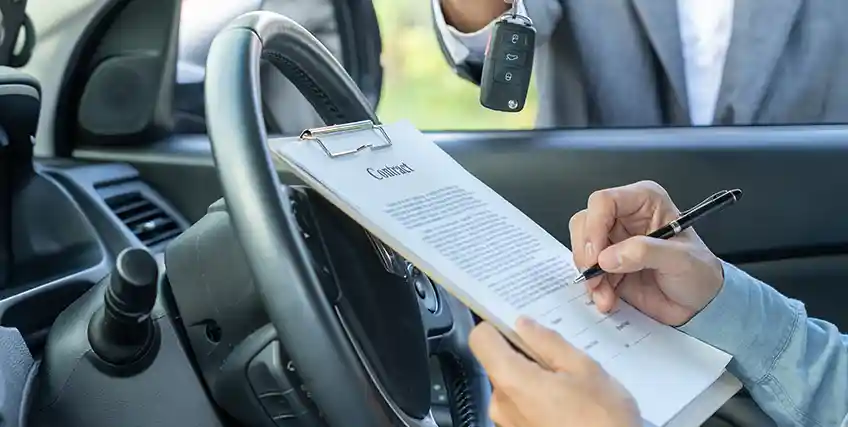Factors Impacting Business Auto Loan Rates in 2026
October 09, 2025 | Last Updated on: October 09, 2025

When applying for auto loans, owners usually explore and compare business auto loan rates offered by different lenders. Business owners should also understand how lenders determine interest rates for business vehicle loans. Different lenders like banks, federal credit unions, and online lenders consider different factors for the same.
These factors include business credit score, overall creditworthiness, income, debt, down payment, and current market conditions. Your interest rate can significantly impact the overall cost of your loan, so knowing the key factors that influence these rates can help you secure the best deal possible.
In this article, discover the top factors affecting business auto loan rates and tips to improve your chances of getting lower interest rates on your vehicle financing.
What is a Business Auto Loan?
A business auto loan is used to purchase a vehicle for a business. It is a type of secured loan where the vehicle itself serves as collateral for the loan. However, a lender can repossess the vehicle if the borrower defaults.
Business auto loan rates often vary by model year as lenders usually offer lower interest rates on newer (current model year) cars and higher rates on older models, because used cars are riskier to finance.
10 Factors that Determine Business Auto Loan Rates
When auto financing for small businesses, understanding the key factors that impact business auto loan rates can help you secure a good deal. Lenders typically use the following factors to determine the interest rates they’ll offer on auto loans for business:
1. Credit Strength
Your credit score is one of the most important factors lenders consider. A higher credit score shows you are a reliable borrower, which typically qualifies you for lower interest rates. Conversely, a low credit score can lead to higher rates or even loan denial. Lenders often evaluate both business and personal credit for new businesses.
2. Income and Debt
Lenders also consider your income and existing debts, because that signals how comfortably you can make new payments. In small business lending generally (including loans for commercial vehicles), regulators emphasize that the primary way to repay a loan is ongoing cash flow, so that there is no need to repossess the asset.
3. Down Payment
Putting more money down upfront reduces the loan amount and the lender’s risk. A higher down payment often results in a better interest rate and can help you avoid owing more than the car’s value.
4. Loan Term
The term for loan payment affects the rate and total interest. Longer terms can mean higher total interest costs and may come with a higher annual percentage rate (APR), even if the monthly payment is smaller. It is wise to track both the rate and the term because the combination drives the total cost you pay.
5. Type of Vehicle
The business auto loan rates for a used car are usually higher than those of a new car. You can also use auto loans to refinance your current car loan. You may also purchase a car nearing its lease term, through auto loans.
6. Type of Lender
- Banks: Traditional banks mostly offer competitive rates but their eligibility requirements and lending criteria are typically strict.
- Credit Unions: Credit unions typically offer lower business auto loan rates and personalized financial service to their members.
- Online Lenders: Online lenders often provide faster credit decisions flexible terms, and convenient loan options, sometimes extending to vehicle and equipment financing.
7. Fees, Add-ons, Markups
Dealership financing can include rate markups and optional add-ons like service contracts, GAP, etc. However, you need not worry about lenders asking for unfair add-ons because regulators have taken action when markups are discriminatory.
8. Market Conditions
External factors like the current interest rate environment, inflation, and overall economic health also influence business auto loan rates. Rates tend to rise when the economy is strong and fall during downturns. Following three reference points matter:
- Federal funds rate: When the Fed raises or lowers this policy rate, other interest rates usually move too.
- Treasury yields: Lenders watch the U.S. Treasury yield curve (benchmarks for different maturities). When Treasury yields rise, fixed rates often follow.
- SOFR (Secured Overnight Financing Rate): SOFR is a modern benchmark tied to overnight loans backed by the U.S. Treasuries. Many business loans and bank funding costs, reference or are influenced by SOFR.
Why this matters right now: According to the latest Consumer Price Index (CPI) report, U.S. inflation over the 12 months ending August 2025 was 2.9%. This is something that the Fed considers while setting its policies, indirectly influencing loan rates.
9. Loan Amount
The total amount you borrow can affect your rate. Sometimes, larger loans come with slightly higher business auto loan rates, as the lender is at more risk. Smaller auto loans may carry lower total costs, though rates vary by lender and credit profile.
10. Collateral & Guarantees
Even though the vehicle itself secures the loan, regulators emphasize that underwriting should put the ability to repay first, and collateral should be the backup. In small business banking and lending, cash flow is the primary repayment source. Therefore, collateral and guarantees affect the approval and pricing.
Tips to get Best Commercial Auto Rates
- Check your credit report before applying and work on improving your business credit if needed.
- Negotiate or decline extra costs that raise your effective APR. You can easily do so, if you have strong credit.
- Avoid accepting the first offer. Seek business auto loan pre-approval from several lenders to compare rates and terms.
- Carefully read through all the terms and conditions of your loan. Make sure you check that the disclosures clearly list every fee and provision before you sign.
Business Auto Loan Rates vs Personal Auto Loan Rates
Personal auto loans are built for everyday consumers while business auto loans are built for companies. That changes how their rates are shown, how they’re set, and what lenders look at.
What You See on Paper:
- Personal loans have to show clear, standardized costs like APR.
- Business loans don’t always come with the same standardized disclosures. Borrowers should request a full cost breakdown (rate, fees, add-ons) to compare similar looking options.
How the Interest Rate is Set:
- Personal loans often have fixed rates and are also widely advertised.
- Business auto loan rates can be either fixed or variable.
Who Gets Evaluated:
- Personal: Lenders primarily evaluate personal credit and income.
- Business: The company’s financials or lines of credit and sometimes the owner’s credit, both get evaluated. Lenders may even ask for a personal guarantee so that you promise to repay if your business can’t.
Which is cheaper?
The rates vary according to the situation. Business auto loan rates can be higher or lower than personal auto loan rates based on risk, loan structure, vehicle age, down payment, and lender type.
Taxes
- Personal car interest generally is not tax-deductible.
- Business vehicle interest can often be tax-deductible for the business-use part, which helps lower after-tax cost.
Be sure to consult with a tax professional before making any tax-related decisions.
Final Thoughts
Business auto loan rates are influenced by several factors, like credit strength, down payment, loan term, loan amount, vehicle age, plus outside forces like lender type and market conditions. An effective way to lower your total cost is to understand how lenders decide their rates for auto loans for business.
To find an ideal deal on commercial auto rates, prepare your business with clean credit, solid cash flow, sensible vehicle choice, and disciplined comparison shopping using clear disclosures. Such measures will help you finance the vehicle you need at a price that protects your profits.
FAQs About Business Auto Loan Rates
1. What determines business auto loan rates?
Business auto loan rates can be influenced by several factors. It varies across lenders. Some of the core factors include business credit strength, cash flow and debts, down payment, loan term, vehicle age, lender type and fees or add-ons, loan amount, collateral or guarantees, and overall market conditions
2. Why are interest rates higher for used cars?
Used car loans often carry higher rates because they’re riskier for lenders. Older, high-mileage vehicles lose value faster and have lower resale (collateral) if repossessed, and with little or no warranty, repair costs can strain a borrower’s budget, thereby raising the chance of missed payments.
3. What is Gap insurance?
Gap insurance covers the “gap” when you owe more than your car is worth. If your car is totaled in an accident, it pays the difference between the car’s value and the remaining loan amount.
4. How can I get a lower rate on auto loans?
Here are some ways to help you get a lower business loan interest rates. Improve your credit and cash flow, make a bigger down payment, choose a shorter term, shop multiple lenders like bank, credit union, and online lenders. Try to avoid add-ons that raise costs and compare the annual percentage rate (APR) across offers.
5. Are business auto loan rates fixed or variable?
Both options exist. Fixed rates stay the same for the whole term, meaning predictable payments. Variable rates can start lower but may rise over time.
Frequent searches leading to this page
Term Loans are made by Itria Ventures LLC or Cross River Bank, Member FDIC. This is not a deposit product. California residents: Itria Ventures LLC is licensed by the Department of Financial Protection and Innovation. Loans are made or arranged pursuant to California Financing Law License # 60DBO-35839




